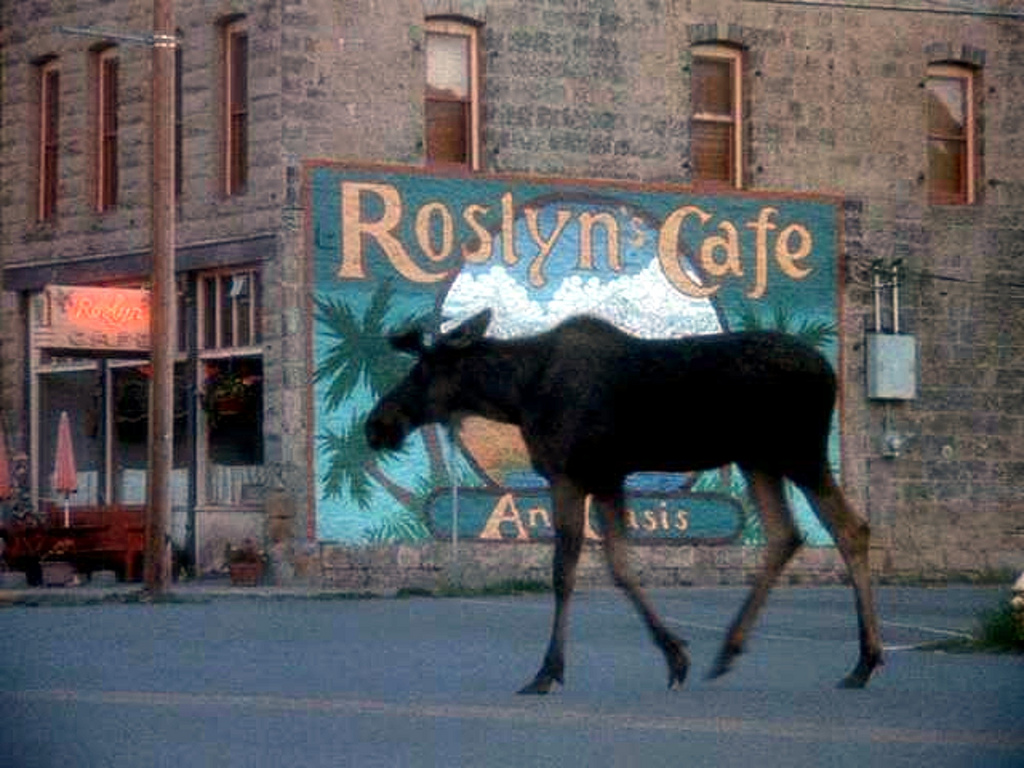
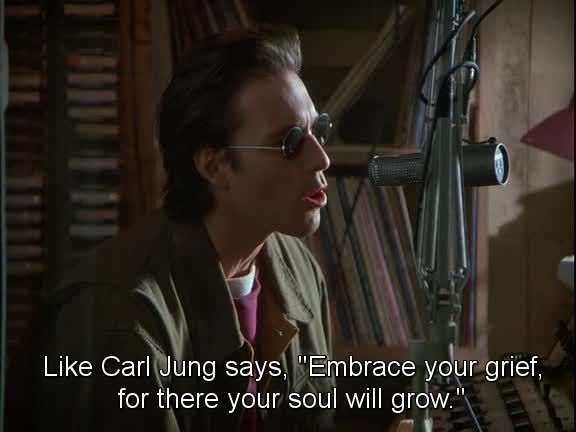
Throughout Northern Exposure, there are a number of direct references to Jung — many delivered with the characteristic light-heartedness of the series. Here’s one of my absolute favorites:
Chris: The collective unconscious.
Shelly: Do they tour, or do they just cut records?
Chris: Well, I’ll be reading excerpts from Jung and his study on Man and His Symbols all week. So… you can catch up.
Bernard: That was you on the radio?
Chris: Yeah.
Bernard: Interesting. Very interesting.
Chris: Have you read any Jung?
Bernard: No. But I’ve had some strange dreams lately. Very strange.
Shelly: Me too.
Chris: Well, everybody does. I mean, Jung says that dreams are the woofer and tweeter of the total sound system.
Later in this same episode, “Aurora Borealis” (S01 EP08), Jung appears in Chris’ dream behind the wheel of a semi, as a stand-in for his absentee trucker father, until the scene devolves into chaos when Jung realizes that he doesn’t know how to drive.
Yet over and above these mentions of Jung directly, those who share my deep interest in Jungian ideas will find much to love in Northern Exposure. The show artfully incorporates mythology, archetypes and dream images, as well as focusing heavily on the personal growth and callings of its main characters. Let’s take a dive into these themes.
1. The Divine Feminine and Women’s Circles
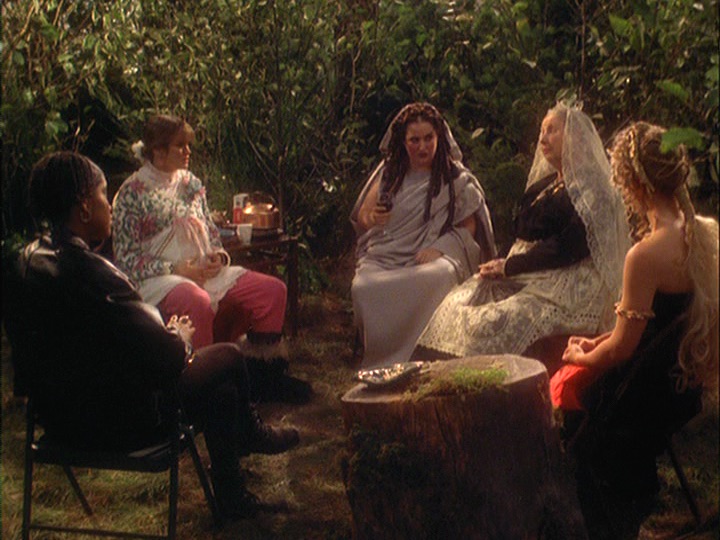
In the episode, “The Robe” (S06 EP05), all of the central female characters are having a book group meeting and Maggie O’Connell (Janine Turner) announces the chosen book: Goddesses in Every Woman, written in 1984 by Jungian analyst and feminist activist Jean Shinoda Bolen. I find it an inspired and perfectly fitting choice for Maggie’s character — a fiercely independent bush pilot who fled from her homemaker predestiny in upper middle class suburban Michigan to recreate herself in Alaska, on her own terms. Bolen’s book is a guide to understanding the archetypes that exist within the feminine psyche, as personified by the goddesses of the Ancient Greek pantheon. It is a tool for unlocking greater self-knowledge, and more specifically, a way of recognizing and embracing those parts of ourselves which we might otherwise repress or ignore, just because they don’t fit into a tidy little box of identity. Within us, we may have the nurturing, maternal tendencies of Demeter, while also possessing the great independence and competitive nature of Artemis.
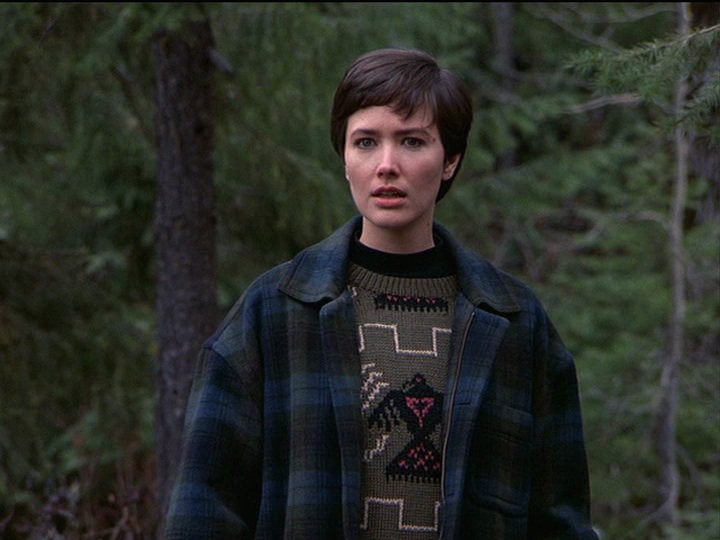
Certainly, Maggie has Artemis energy in spades — that archer goddess whose domain is the hunt and the moon. Maggie is unafraid to speak her mind and beyond capable of holding her own in traditionally male-dominated settings. In fact, some of her most iconic moments involve hurling vitriolic epithets at Joel, e.g., “You are the most vile, odious waste of corpuscles I have ever seen!” in “Soapy Sanderson” (S01 EP03) when he fails to show up for her or the community. (Plenty more on Joel later in this piece.) Her moods can change like the moon phases, but importantly, she always lets them have expression. She seems to possess a great trust in her intuition.
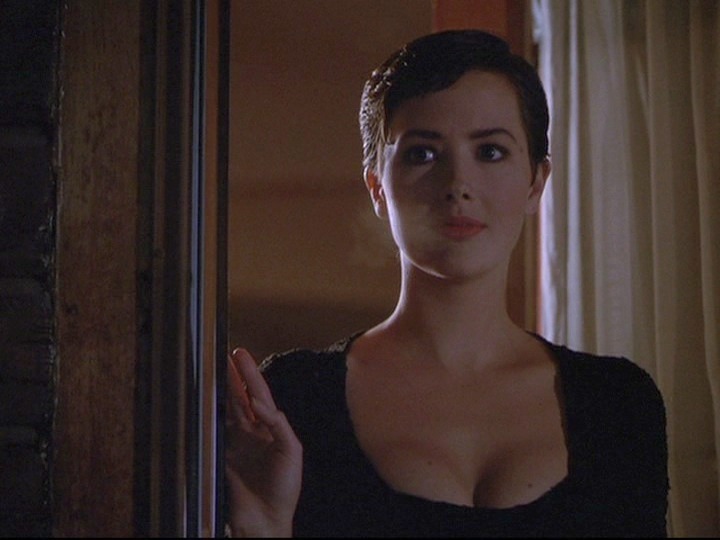
She is also divine in her moments of softening, when she opens up to love and embraces the Aphrodite part of herself — goddess of love, sensuality and beauty. She is as glamorous as a 1940s starlet when she dons evening wear, in episodes like “It Happened in Juneau” (S03 EP21). Sometimes this Aphrodite aspect is accessed through experiences with a fairy tale quality. For example, in one episode, “Wake Up Call” (S03 EP19), she meets a gorgeous suitor (who looks a bit like a Nordic god) who sweeps her off her feet and stirs her passions in a time of loneliness. When she goes looking for him after he disappears — to his cave home where they once shared mead — she can find no trace of the man nor any belongings…
But she does spot a brown bear — the same brown bear whose first sighting in town had coincided with the mysterious arrival of the handsome stranger, Arthur. We are left with the same numinous conviction as Maggie: Arthur is a bear. He is an animal ally, coming to Maggie in a supportive role to help her access her inner Aphrodite.
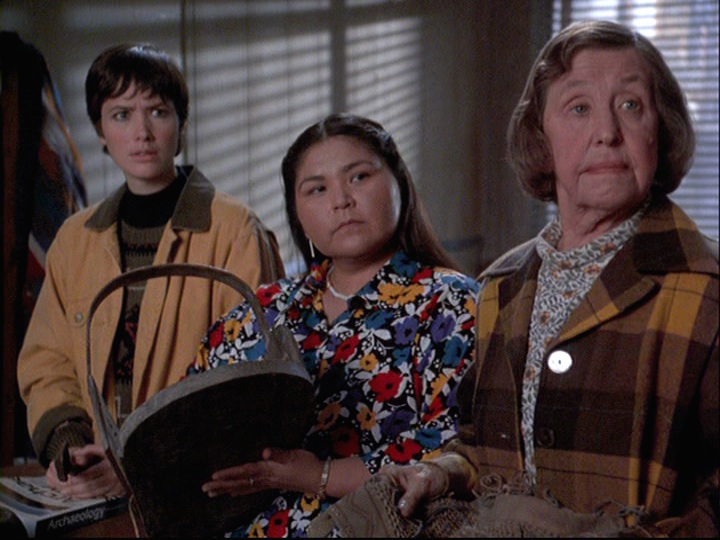
Returning to the aforementioned author, Jean Shinoda Bolen is a great proponent (like many Jungians) of women’s circles; of women coming together to share their experiences and wisdom, and celebrate one another through various phases of life. Thinking on this idea of feminine kinship, I’m reminded of an episode, “Survival of the Species” (S04 EP11), in which Maggie discovers artifacts buried deep in her yard from the Indigenous ancestors of the land. Enlisting help with the excavation, she ends up frustrated that her yard is overtaken by a parade of men — all with strong ideas of what to do with the objects and their potential profit — especially given that the artifacts are thought to be domestic in nature; traditionally “women’s things.” With all the ferocity of the goddess, she kicks all the men out of her yard. After that, she works joyfully alongside the other women in town to re-bury the items and let them rest undisturbed.
Another very memorable instance of women’s circles in the series takes place during Shelly Tambo’s baby shower, in the episode “Baby Blues” (S05 EP11). Shelly (Cynthia Geary) is the slang-spouting, stylish young server at the local tavern, The Brick, where she is deeply in love and “shacked up” (her words) with the sexagenerian proprietor Holling Vincoeur (John Collum), in what would be put mildly as a May-December romance. When the two are on the verge of welcoming their first child, Shelly becomes distraught at her baby shower. Overwhelmed partially by her fears around childbirth — as the mothers at her shower all swap labor horror stories — she is thrown into great self-doubt about her own ability to be a good mother. Fleeing the party and wandering into the woods, she comes across a women’s circle of mythic proportions. Mother Nature (played by the fabulous Regina King in a leather jacket) is moderating a support group for mothers, including Olympias (mother to Alexander the Great), Queen Victoria, and (gulp) Medea. Mother Nature gives Shelley the reassurance that she’s not alone in her doubts and struggles. Shelley emerges from the woods, ostensibly out of a dream, with a new sense of confidence.
(As an aside, this episode also features Chris attempting to connect with his inner anima or feminine side, and getting a bit carried away in the process by interjecting during motherly discussions at the shower, until he — to use his character’s own words upon reflecting on the incident — is “told in no uncertain terms to take a hike”).
2. The Multitudinous Self
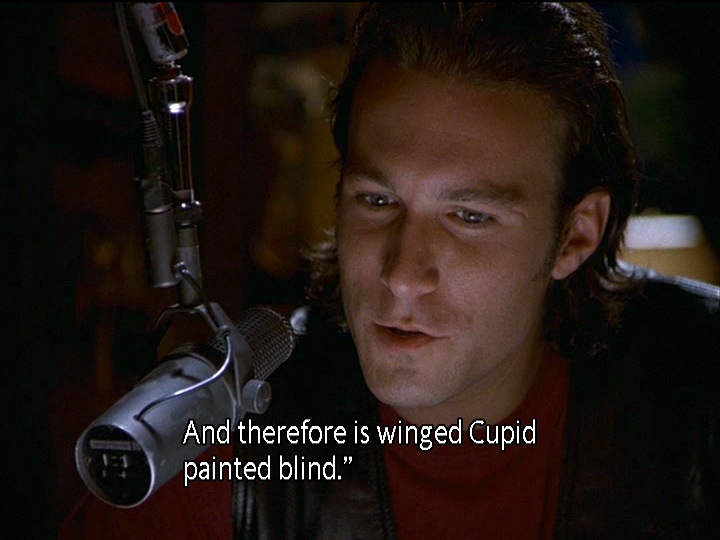
Oh, Chris Stevens. Chris is the town’s radio DJ, broadcasting daily from the local station KBHR (pronounced “K-bear”) under the moniker Chris in the Morning. He is the town philosopher, sharing relevant passages and ideas on the airwaves to imbue the seasons and events of the town with meaning, for the benefit of the townspeople and the viewer alike (where, in situating the viewer, he works a bit like a narrator). He quotes everyone from Jung and Krishnamurti to Jack London and Maurice Sendak. He’s also the closest thing to a clergyman in town, having answered an ad in the back of Rolling Stone to seek ordainment — and as such, performs all the funerals and weddings (where he’s likely to quote a Hindu proverb in the chapel) as well as taking confession for Shelly, Cicely’s lone Catholic. He’s also a visual artist, working primarily in large scale metal sculptures, and a man very, very loved by the ladies.
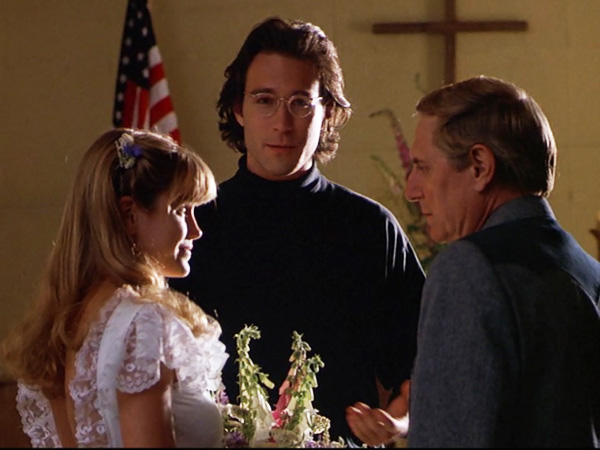
I can hardly think of a more influential character in my own romantic life, in terms of my taste in men and the proclivities to which I’m drawn. I can only marvel at the strange and sweet synchronicities that have arisen to this end: one of my past lovers shares a birthday with John Corbett (the actor who played Chris Stevens) and another shares a birthday with the Chris character himself! In fact, the most heated lovers’ quarrel that I’ve ever gotten into was when the man sharing Corbett’s birthday, perhaps to stir the pot or perhaps in sincerity, wondered aloud whether Chris might be “bullshit”. Needless to say, I passionately defended Chris — but the process of doing so led me into deeper reflection on the character than I’d ever engaged in before.
Wherefore “bullshit”? Well, viewing the character with a dose of cynicism, it may be easy to read Chris as flaky, or even as inauthentic. He dabbles in many pursuits, and even more philosophies — trying each side of an argument on for size, exploring possibilities as opposed to dealing verdicts. It could be easy to write him off as a Jack of all Trades, Master of None. Or worse, given the inextricable link between sex and art for his character, to view his creative pursuits as mere Casanova’s ploys. But to do this, I believe, would be to deeply misunderstand Chris and his spirit.
The North Star for Chris, as I’ve always seen it, is Walt Whitman. Having discovered Leaves of Grass while in prison, Chris was transformed and set on the poet-philosopher’s path he now walks in Cicely. (Chris came from a traumatic childhood in West Virginia and had a young career of trouble with the law, before building his new life in Alaska.) With Chris, I am reminded of Whitman’s famous lines from Song of Myself, 51:
Do I contradict myself?
Very well then I contradict myself,
(I am large, I contain multitudes.)
Chris contains multitudes, and in the Jungian paradigm, this is a very healthy way to be, . He is able to sit more comfortably than many with the tension of opposites, and embrace the varied and even contradictory aspects of his own nature (and his own thinking), rather than repressing or rejecting. He seems to be engaged in the process of individuation — that of bringing the unconscious parts of ourselves to consciousness. An aspect of this is understanding that every quality has a shadow side, and that this shadow must be brought into awareness in order to be integrated into the self.
An example of this in action is Chris playing the role of the archetypal trickster. In one episode, “Spring Break” (S02 EP05), Cicely — an otherwise crime-free town — experiences its annual wave of petty thefts (of items like hairdryers and radios) during the spring thaw. When it is finally discovered that Chris has been behind the robberies all along, he simply responds, “Sometimes you have to do something bad just to know you’re alive.” He can keep the town on its toes and cause a little mischief and chaos, even while being instrumental in many of its most important rituals, as a spiritual practitioner. In both modes, he is essential to the fabric of the town, as both modes are a type of teaching and a way of affirming life.
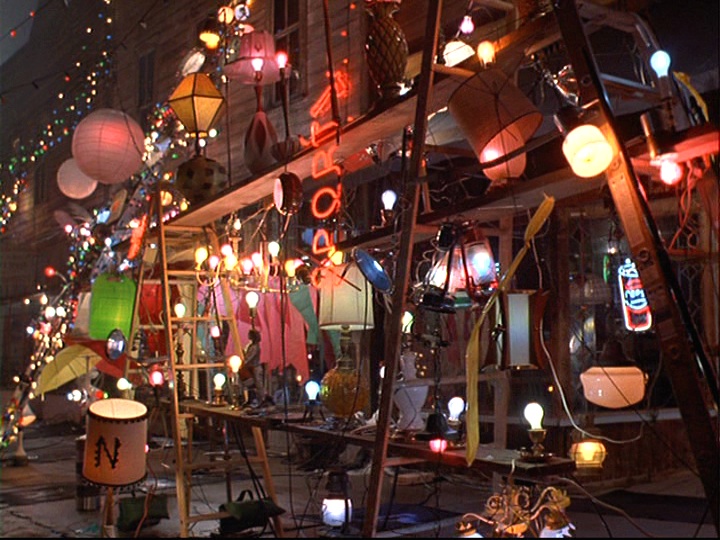
In another episode, “The Northern Lights” (S04 EP18), Chris takes lights of all kinds (from lamps to neon bar signs) from all over town, to combine them into a giant sculpture of dazzling brightness. He cites Goethe’s last words upon its unveiling, declaring: “More light.” With this sculpture, he truly presents a strong symbolic image for his work with the collective consciousness of the town. Light, the solar energy of consciousness, is brought from many sources and individuals into a co-creative collective vision — one which Chris channels and invites participation into.
 Chris, the lover boy, in “Only You” (S03 EP02).
Chris, the lover boy, in “Only You” (S03 EP02).As for his romantic tendencies, while Chris is certainly known to be the lover boy (I often think of him when I pull the Knight of Cups tarot card), his paradigm is not one of hyper-masculine conquest. By contrast, he seems to embody the capital-R-Romantics’ exaltation of love and beauty in its various forms. This includes the feminine corporeal form, just as much as it includes the majesty of the wilderness, or a moving poem. If anything, in seeking the muse of artistic beauty, Chris embodies a radical receptivity — one which sometimes even gets him in trouble. This is illustrated in episodes like “The Big Kiss” (S02 EP02), where through a seeming enchantment from a beautiful female passerby, Chris loses his voice and must regain it — in true fairy tale form — by a kiss from the most lovely woman in town (Maggie, of course).
Chris also grapples with issues of ego and projection in the context of romantic love, recognizing when his own blind spots have gotten the best of him, and reflecting on that experience. I’m reminded of the episode “Only You” (S03 EP02), when Chris, through an apparently seasonal profusion of pheromones that eludes medical science, possesses an “irresistible magnetism” that attracts every woman in Cicely… except for the itinerant optometrist. Due to her immunity to his charms, Chris becomes romantically obsessed– suffering that all-too-familiar ego blow of unrequited love, and projecting all his romantic yearnings on to her, which will never be fulfilled. He tells her, in characteristic authenticity and complexity: “The rejection has been devastating. It’s like an emotional tsunami. I’m in this excruciating pain. I feel like I’m losing my mind. It’s great! Thanks for the experience.”
Ultimately, Chris is forever a student of life, and an embracer of life as well. In the episode “Jules et Joel” (S03 EP05), Chris proclaims one of the show’s most beloved and oft-quoted prescriptions over the KBHR airwaves: “As brother Nietzsche said, being human is a complicated gig. So give that ol’ dark night of the soul a hug. Howl the eternal yes!”
(And yes, I did eventually win that lovers’ quarrel about Chris. That Christmas, the provocateur in question gifted me a piece of Northern Exposure memorabilia, a compilation book of Chris in the Morning quotations, in which he’d written a front page inscription: “Okay, Okay. You Win!”)
3. Myth, Magic and Personal Narrative
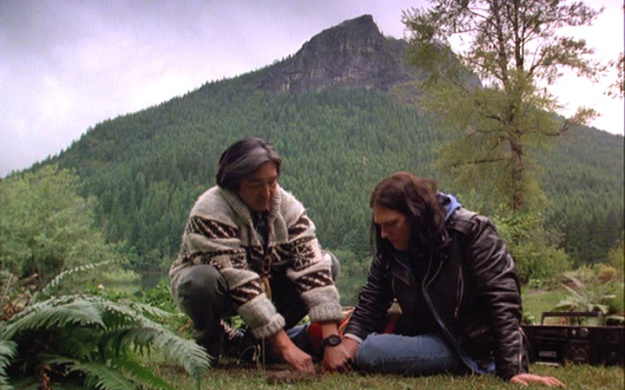
In Cicely, the veil between the spirit world and the material world is thin. Just about every major character in this special town experiences something of the imaginal realm (the domain of potent symbolic images within the psyche, as understood in the Jungian depth psychological tradition) in a powerful way. It may be through vivid dreams or visions carrying messages, or remarkable experiences that strike them as anywhere from spiritually significant to downright magical. But the character of Ed Chigliak (Darren Burrows), seems to experience the imaginal most powerfully, and seems most naturally adept at operating in the liminal space between worlds.
Cicely is depicted within the region of southeastern Alaska where the Tlingit (/klɪŋkɪt/) were the original people, and Ed is a Tlingit young adult. He is an orphan, who was adopted collectively by his clan. He is also a film buff with encyclopedic knowledge, known to share cinematic references for just about every occasion.
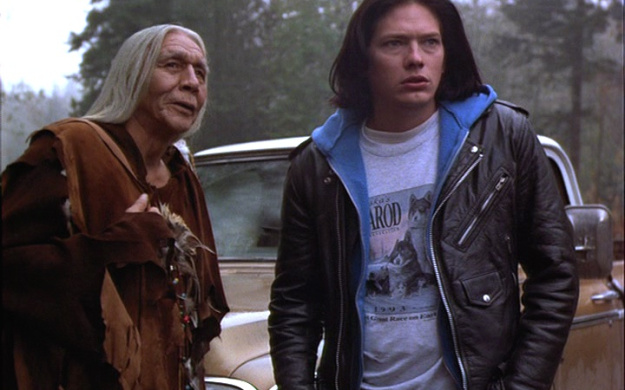
As an accepted reality of his waking life, Ed walks with spirits. This is surely in no small part the influence of his Tlingit ancestors and their bestowed gifts. For example, “One-Who-Waits,” one of his ancestor spirits, appears to him in order to aid Ed’s quest to find his biological parents in episodes “The Big Kiss” (S02 EP02) and “Duets” (S04 EP13). But his appearance also points to Ed’s psychic sensitivity and transpersonal understanding.
These are traits perhaps recognized by Leonard Quinhagak (Graham Greene), a shaman in the region, who suggests that it may be Ed’s calling to become a healer. In “Three Doctors” (S05 EP01), Ed finds himself waking up mysteriously in different high places (in a tree, on top of a building), and suspects that he must be not just sleepwalking, but sleep-flying. When he confides this to Leonard, Leonard explains that such an experience is “transcendental” and “indicates a person who straddles both the physical world and its metaphysical counterpart.” Leonard then performs a ritual to assess Ed’s fitness for training to become a shaman. Ed’s closed hand is buried deep in the dirt, where he must sit with it buried for a few days. Upon uncovering it, he is found to have a ball of roots sitting in his palm: a positive omen.
Ed is a gentle, compassionate soul. So gentle in fact, that he must actually engage in a healthy process of ego development, as experienced mythically in his interactions with The Green Man in the episode “Heal Thyself” (S05 EP08). The Green Man, a trickster forest spirit widely known across many cultures and eras, manifests in Ed’s experience as a glittering green demon with a malicious tone. Only when Ed is able to defeat this demon — which is his self-doubt and poor self image personified — may he more fully share his gifts with the world.
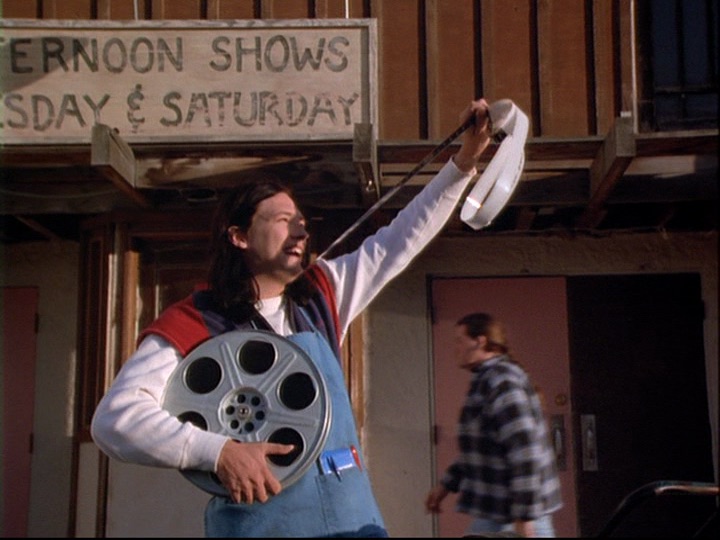
Despite his gifts, Ed struggles with the very relatable dilemma of finding meaningful life’s work. Even when one hears the call towards a certain vocation, it may be difficult to find the courage to heed it, or to know the best way forward. In Ed’s case, it is his love and pursuit of cinema (as an aspiring director and film festival curator), which exists in seeming conflict with his studies towards becoming a shaman. In the episode “Rosebud” (S05 EP07), he seeks counsel about his dilemma from both Leonard and the Hollywood director Peter Bogdanovich, who guest stars as Ed’s long distance friend.
Ultimately, Ed sees the world in terms of stories, and he works best when he is able to weave together his two modes of storytelling: the cinematic myths expressed in filmmaking / screenwriting, and the healing words of the medicine man alike. Ed is the most fulfilled and happiest when he arrives at the decision to create a project that only he could write and direct: a movie about a shaman in a small town in Alaska. Truly, Ed lives — and shares — the immense power of crafting one’s personal narrative out of one’s unique lived experience.
4. Transformation and the Hero’s Journey
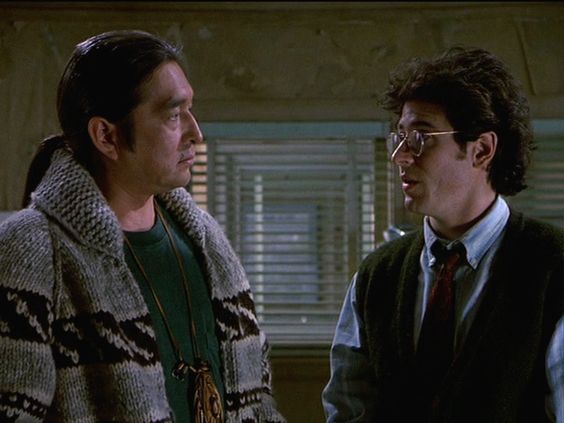
Ultimately, the central storyline of Northern Exposure is that of Dr. Joel Fleischman (Rob Morrow). Joel is a recent medical school graduate from New York City, who has agreed to a contract with the state of Alaska, to practice medicine there for several years in exchange for them paying for his education. A city boy born and raised, Joel is optimistic about his lifestyle while under the assumption that he’d be practicing in Anchorage. In the show’s pilot episode, he arrives to discover that he will instead be stationed in the tiny, remote town of Cicely. Joel arrives in Cicely as a neurotic, nervous, inflexible person with a great deal of prejudice against rural life and defenses against the unknown. His role for much of the show is to stand in harsh juxtaposition to the residents of Cicely, who are by and large adaptable, and comfortable with vulnerability. But there is a deep joy and beauty in watching the show progress across seasons, as Joel is challenged to examine his own beliefs, and slowly begins to open his heart up to the community of Cicely, and allow himself to be changed by it.
One major aspect of this is in his own medical practice, as he arrives with a rigid resistance to anything outside of his training in Western medicine. He engages in dialogue with a few shamans in the region, learning of Indigenous ways of healing which are nourishing and effective for much of the community he serves. Sometimes it may be the remedy itself, as in one early episode,”Russian Flu” (S01 EP05), when Joel’s assistant Marilyn Whirlwind (Elaine Miles) whips up a poultice of unrevealed natural ingredients, which cures the flu that had affected much of the town — despite his protests against her doing so. He also has much to learn about bedside manner, and what it means to engage in a soulful and respectful way with his patients. In the episode “Wake Up Call” (S03 EP19), the healer Leonard shadows Joel, out of curiosity about Western medicine. Leonard is extremely surprised to find that Joel spends so little time with a patient before making his diagnosis, explaining that in his own practice he is known to spend hours or days speaking with a patient. It is made clear as we watch Leonard’s approach, that with his method, he is able to uncover the spiritual root of a patient’s symptoms, in a way that Joel often overlooks.
As in a previously mentioned episode, “Three Doctors” (S05 EP01), where Chris shares a quote over the airwaves (though I have found no known attribution outside of the series): “The healer’s art at its best is insight wedded to compassion, and thus medicine, no less than religion, is a matter of the spirit, of the figurative heart, of the soul. True medicine embraces the belief that each and every one of us is important, and that we are all under the canopy of heaven alike.”
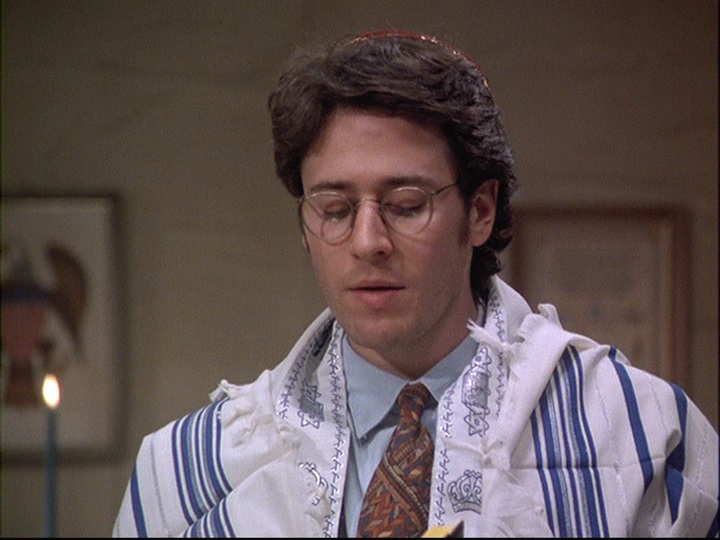
Joel does eventually come to share something of his own soul with the community of Cicely, especially around his Jewish faith. In one touching episode, “Kaddish for Uncle Manny” (S04 EP22), Joel is deeply saddened and feels isolated when he realizes that he won’t be able to say the Kaddish (a prayer mourning the dead) after his uncle’s passing, because the ritual requires a minyan of ten Jews, and there are none other than him in Cicely. The town bands together to comb the whole region looking for those of the Jewish faith to join Joel for the Kaddish. Ultimately, he realizes the most important thing is simply coming together in community with shared intention — and, setting the exact letter of the tradition aside in favor of its spirit, he performs the Kaddish with his friends in Cicely.
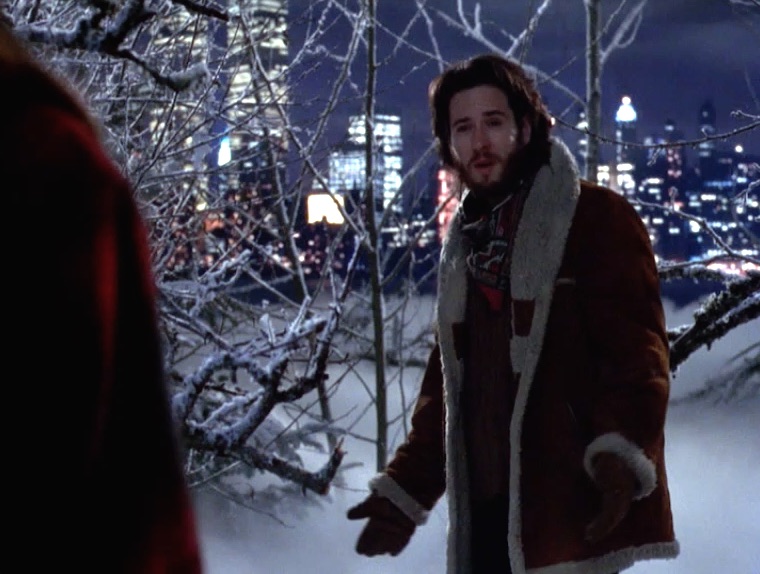
Eventually, by the show’s final season, Joel is entirely transformed by Cicely — by its inhabitants, and perhaps, by the soul of the landscape itself. We say goodbye to Joel in an episode called “The Quest” (S06 EP15), the most immersively and overtly mythological episode of the entire series (which is really saying something). Joel finds an old treasure map leading to the fabled “Jeweled City of the North” and sets out with Maggie to follow it. Their journey, which pulls heavily from The Odyssey as well as Arthurian legend, helps to bring into focus and lend archetypal resonance to the hero’s journey that Joel has been on throughout the whole series. Joseph Campbell, the great mythologist and scholar of Jungian ideas, who introduced the hero’s journey to the masses, stated simply that, “The goal of the hero’s journey is finding yourself.” Joel embarks on this journey of self-discovery when he lands in Cicely, far from his known world, albeit kicking and screaming for a while. He is tested greatly, but he discovers powerful allies too.
One of these allies was certainly Maggie, with whom Joel had a very fiery and tumultuous love-hate relationship across the seasons of the series. The two had undeniable passion and chemistry, to which they eventually gave in, becoming engaged and moving in together. Not long before embarking on this journey in “The Quest” (S06 EP15), Maggie had broken off their romantic relationship, explaining that she couldn’t be with someone who clings so tightly to everything. Joel was devastated, but ends up spiritually resurrected as a new man — finally able to see how to let go, be grateful for the present moment, and take life as it comes to him (this break-up and subsequent transformation is told to Ed by Joel in “Up River” (S06 EP08).
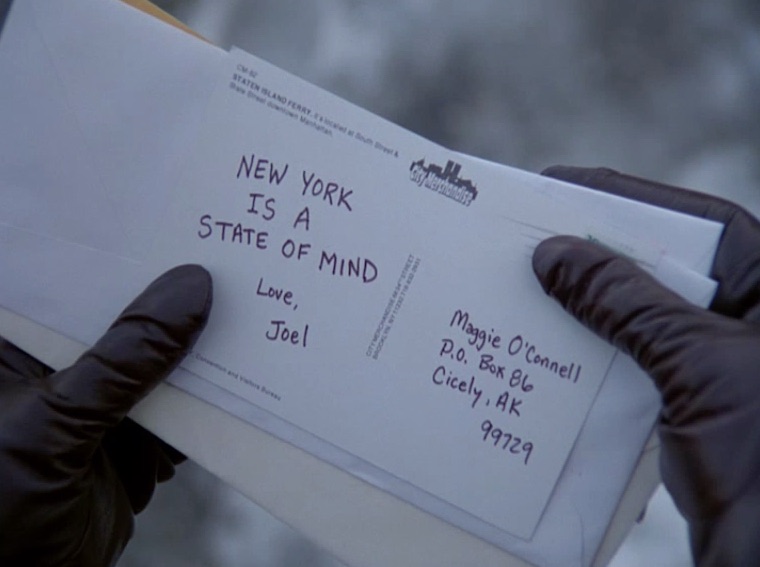
One of the most potent moments in all of “The Quest” is when Joel must answer a riddle in order to convince a gatekeeper to let them pass.
The question: “How do you keep the one you love?”
Joel wisely gives the correct answer: “You don’t. Love is selfless; non-possessive.”
In this moment, it is clear that, indeed, Maggie has given Joel the greatest gift she could possibly have given him.
When they finally reach the Jeweled City, it is discovered, somehow, to be a sort of portal to New York City. Maggie bids farewell to Joel, sending him on his mythic return home, equipped with all the gifts from his time in Cicely. She receives a postcard shortly after from the Staten Island Ferry, on which Joel has written: “New York is a State of Mind.”
5. An Ensouled Town
In descriptions of this show in the media, Cicely and its townspeople are often referred to as “quirky.” I take issue with this word, because it’s wholly insufficient in describing this remarkable series and its characters.To better do it justice, I might propose instead that we call Cicely an ensouled town. By ensouled, I mean to reference an idea of which Jung spoke (with roots in the ancient alchemical tradition) of the Anima Mundi, or World-Soul, which pervades matter. This is the notion, over and above the collective unconscious which is universal and a priori for all mankind, of a deep interconnectedness and unfolding of meaning in the entire physical universe. In Northern Exposure, one feels Cicely itself to be a living, breathing, being. Its central characters coexist with it in a deeply soulful, deeply ecological manner. This is the root of its magic, and, I believe, what keeps its fans coming back to it again and again.
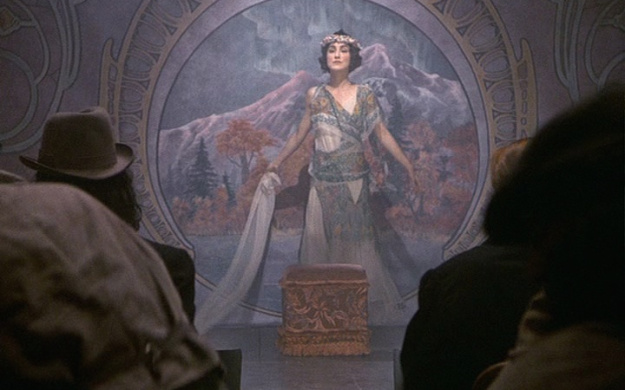
It even led me and my mother to take a pilgrimage a few years ago to Roslyn, Washington, the real-life town where the series was filmed, for a recurring official fan gathering called “Moose Fest.” I had a blast touring filming locations and meeting some of the show’s stars, and even took home a runner-up trophy in the costume contest (I dressed as the character of Cicely, the town’s eponymous co-founder in the early twentieth century. She was a queer performance artist, whose story is told in an Emmy-winning flashback episode, also called “Cicely” (S03 EP23). But most of all, I was so impressed by the fans: by their insightfulness, their absolute dedication to the series, and their multivalent authenticity as individuals. My new friends from that weekend in Roslyn include a retired college professor, a touring member of a successful BeeGees tribute band, and a pair of young Italian newlyweds who had ventured from Rome to Roslyn for their honeymoon. Something that we all share, despite our various lives and backgrounds, is having been nourished and even emboldened by this series. Cicely is a spiritual home for us, and one that encourages a deep sense of self. Cicely, it seems, is also a state of mind.
There have been many rumblings in the past few years about a potential reboot of this series — a possibility being actively discussed by Joshua Brand (one of the show’s creators) and Rob Morrow (Joel). My hopes for the reboot are twofold. The first is that it happens at all, to bring this show to many more people’s awareness. Unlike its contemporary Twin Peaks, (to which it drew many comparisons early on, even culminating in a Twin Peaks spoof scene in its first season), Northern Exposure has never been available on any streaming service. I add my voice to the choir of fans who mourn this fact, as it has limited the opportunity for younger generations to discover this truly incredible show.
As for my second hope: I hope that a potential reboot retains the series’ fundamental character of being heartening, rich with mythology, and enchanting in its awareness of an ensouled world. Those of us exploring Jungian ideas would certainly be happy.
I’ll leave you with a final reflection on the series from Josh Brand himself, in a recent interview shared on the Writers Panel podcast, which I think is quietly perfect:
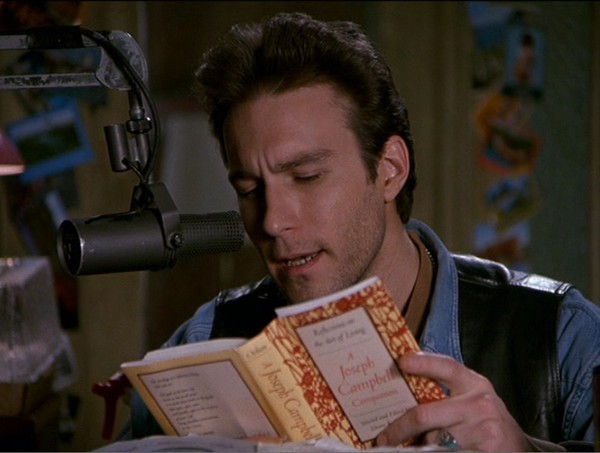
Ω


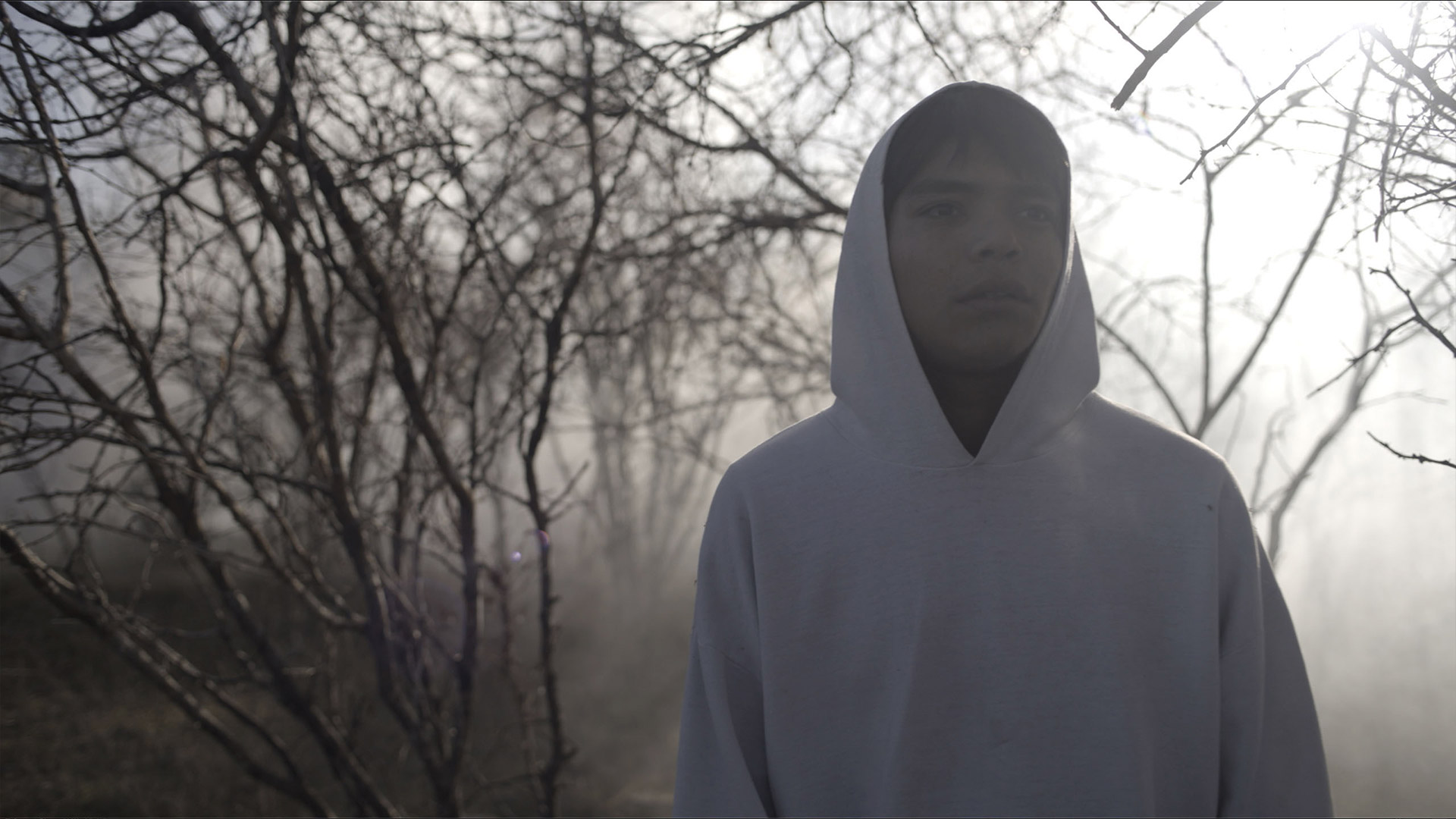

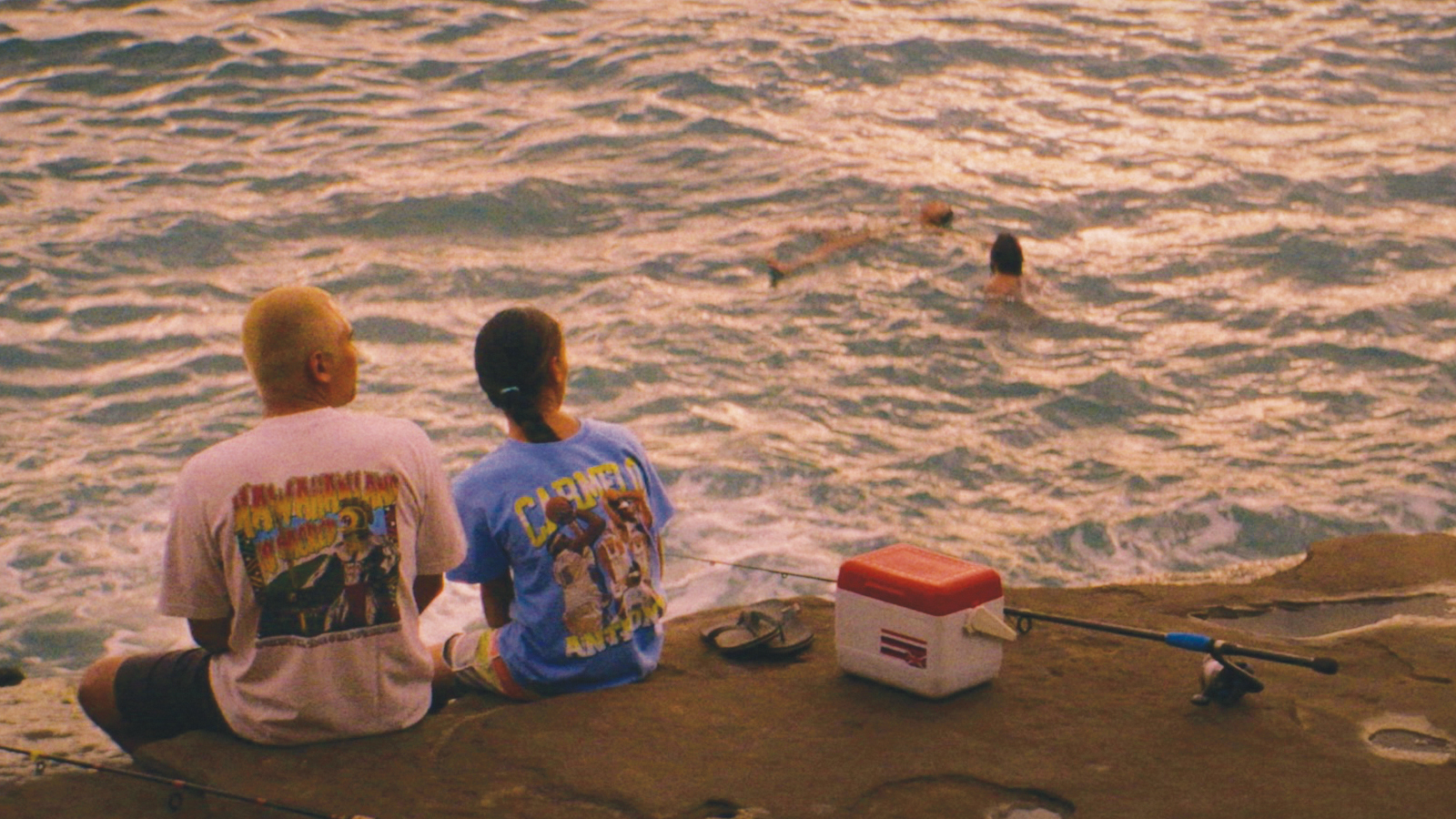
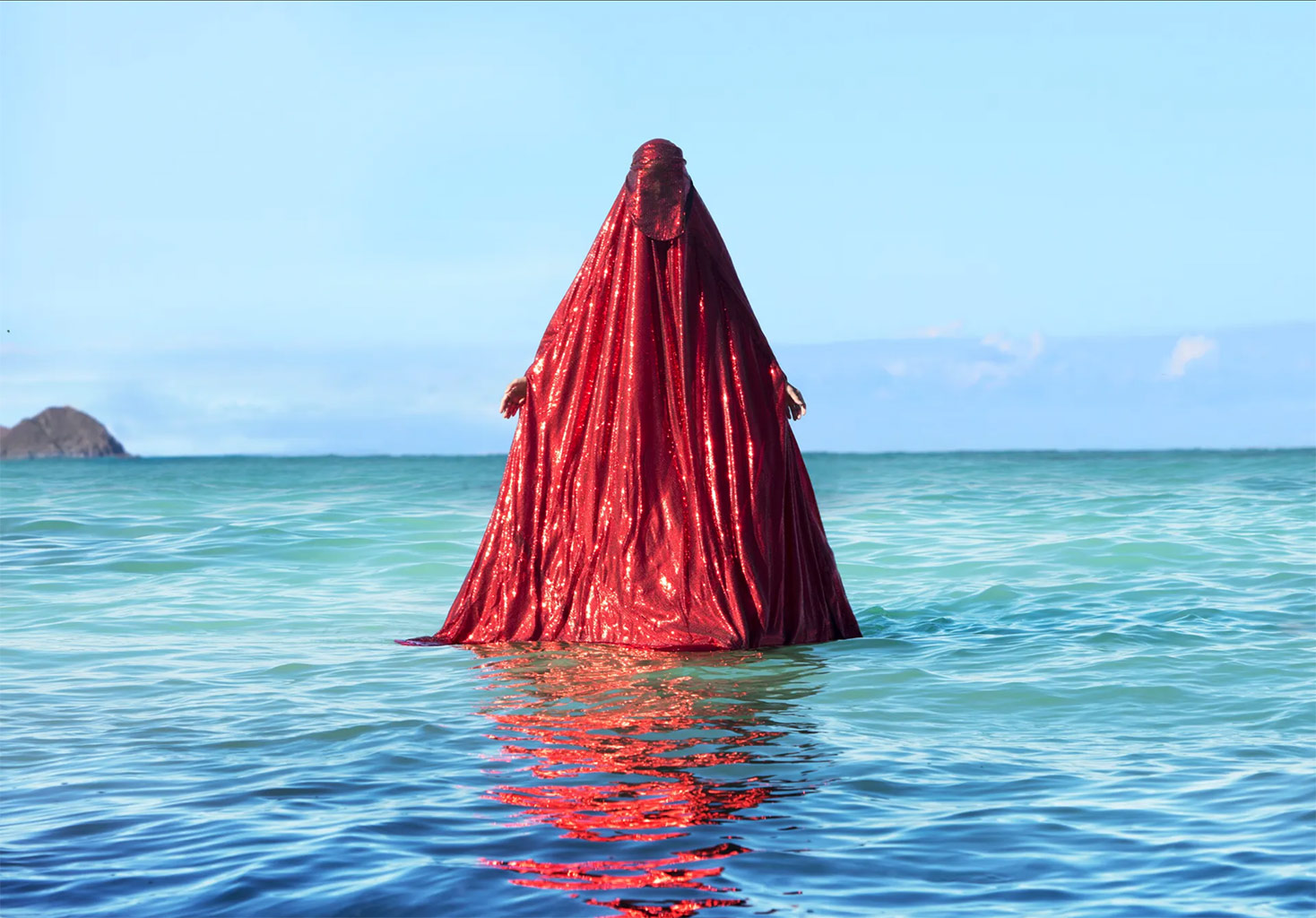
I share your hopes for a reboot. As for streaming, newcomers to the series may notice that the first season on DVD has beautifully integrated music throughout but that subsequent seasons lose this quality in favor of imperfect substitutions from a list of public domain titles. The cost of music rights became prohibitive and prevents streaming services from airing the originals. My idea is that someone needs to craft a legal third option whereby unaltered episodes can be aired via a music streaming service like Spotify. It’s not straightforward so someone will have to shoulder the burden of carving out a legal and affordable way to do it. In the mean time, originals can be found on dvds for region 2 (viewed from a region 2 device).
Beautifully written synopsis of the best series on TV. Excerpt from your article sums it up for me. “In Northern Exposure, one feels Cicely itself to be a living, breathing, being. Its central characters coexist with it in a deeply soulful, deeply ecological manner. This is the root of its magic, and, I believe, what keeps its fans coming back to it again and again.”
Thank you for sharing these memories. I watch NX every Sunday on kbhr570,com. Vaughn Streaming also airs usually 24/7, but sometimes it is off air.
archive.org has the whole series with original music throughout!!
thanks for this very well written article about Northern Exposure. i’ve been waiting to watch it for years and am nearly done since its 2024 release with original music on amazon. i really think the show holds up very well, and enjoy the magical realism with drama and philosophy plus enjoyed reading your analysis! thank you.